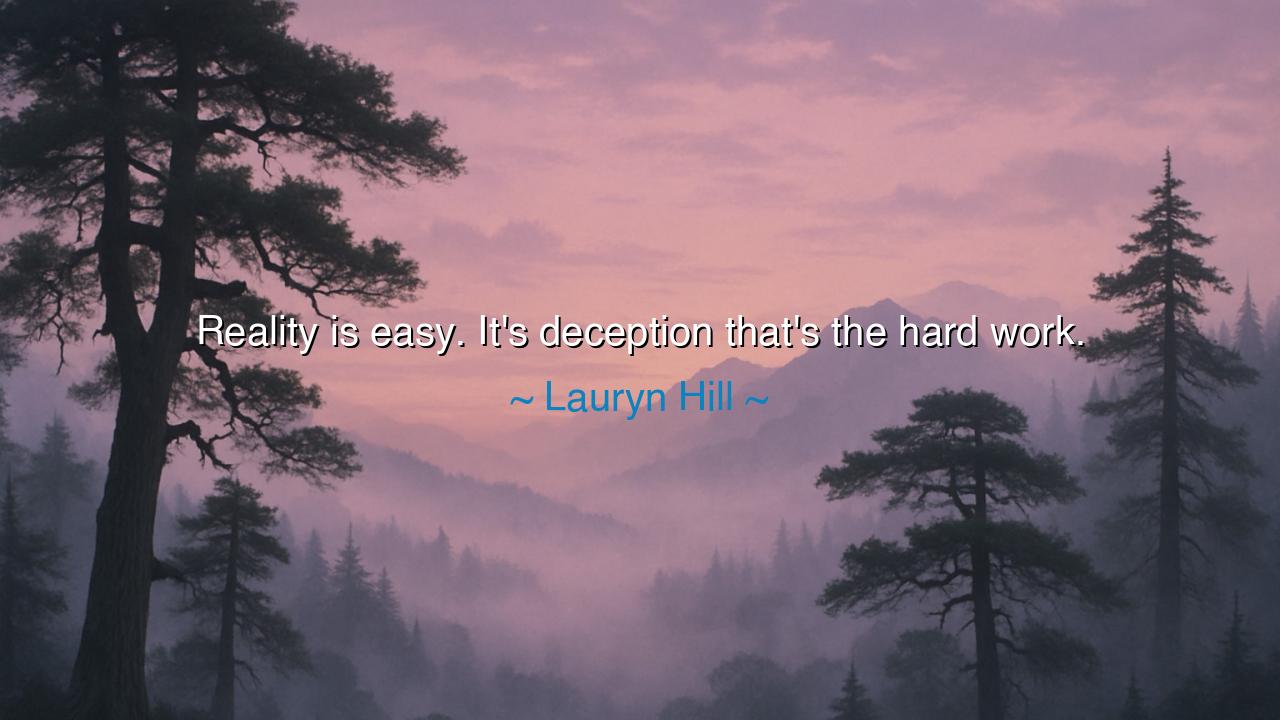
Reality is easy. It's deception that's the hard work.






When Lauryn Hill declares, “Reality is easy. It’s deception that’s the hard work,” she speaks with the clarity of one who has seen through the masks of the world. Her words remind us that truth, in its essence, stands simple and unshaken, while lies demand endless labor to construct, maintain, and defend. To embrace reality is to live in peace; to embrace deception is to toil in bondage.
The origin of this wisdom lies in Hill’s own journey through fame, art, and spiritual seeking. In the world of music and celebrity, where image often overshadows truth, she discerned that the greatest burden was not in living authentically but in sustaining illusions. To live by deception is to weave a web that must be constantly repaired, a fortress that crumbles without ceaseless effort.
To say that reality is “easy” is not to deny its hardships, but to honor its simplicity. The truth does not require embellishment, and authenticity demands no disguise. In contrast, deception is exhausting, for one lie must give birth to another, and the soul grows weary carrying what was never meant to be borne. Thus, Hill’s words echo the wisdom of the ancients: that truth is light, and falsehood a heavy chain.
Her teaching also serves as a warning. Many seek shortcuts through deception, believing it easier than honesty, but they find themselves entangled in endless struggle. Work that begins in falsehood cannot rest, for it must always be defended. The one who chooses reality, however, walks freely, their energy devoted not to maintaining appearances, but to living fully.
Let the generations remember: authenticity is the path of freedom, and deception the path of slavery. Lauryn Hill’s words endure as a beacon, teaching that the soul’s true rest is found not in the exhausting labor of illusion, but in the simple strength of embracing reality as it is.






MPNguyen Minh Phat
Lauryn Hill’s words speak to the heavy burden of deception. It’s true that keeping up lies or avoiding the truth takes so much more effort than just being honest with oneself. Why do you think people are so reluctant to face reality? Is it because the truth feels too harsh, or are we just conditioned to prefer comfort over confronting what’s real?
LCLam caooo
Hill’s quote is a powerful reminder of how hard it can be to maintain a false narrative. It makes me wonder—do we deceive ourselves more than we deceive others? Is there a sense of protection in deception, or does it only add to the stress and confusion in our lives? Can we ever truly be free if we’re living in a self-made illusion?
DMPham Duc Minh
I find Lauryn Hill’s perspective fascinating—deception really is exhausting, whereas reality doesn’t require that same effort. Why do you think people often find it easier to lie or create illusions, even when the truth is simpler? Does this mean we’re afraid of the truth or just unwilling to confront it head-on? What impact do you think deception has on our relationships and mental well-being?
ANAnh Ngoc
Lauryn Hill’s quote really makes me think about the effort it takes to maintain facades and illusions. Deception requires constant energy to uphold, while reality is much more straightforward. Do you think people often deceive themselves in order to avoid the simplicity of reality? What do you think drives us to complicate our lives with falsehoods instead of accepting the truth as it is?